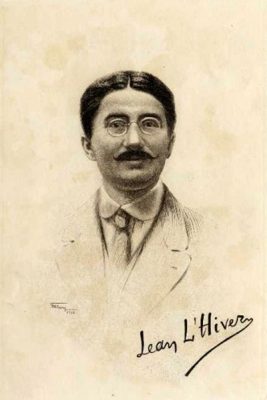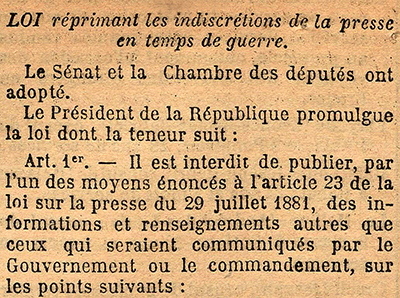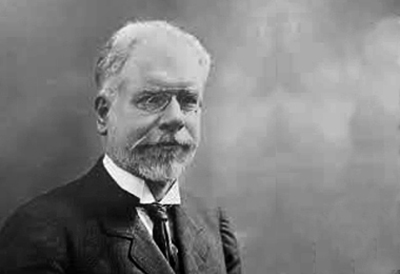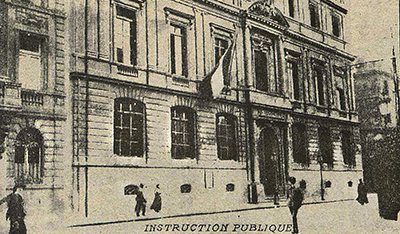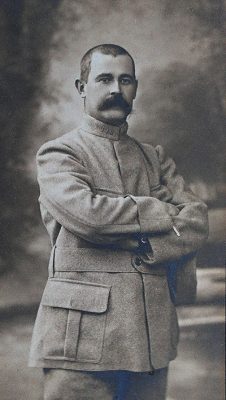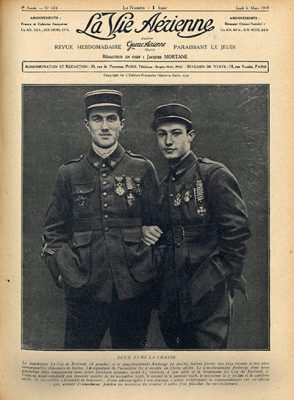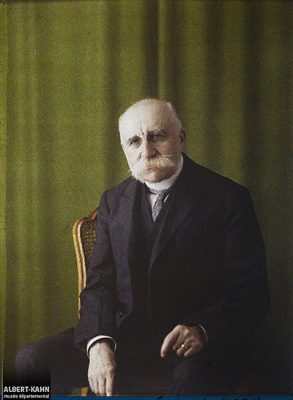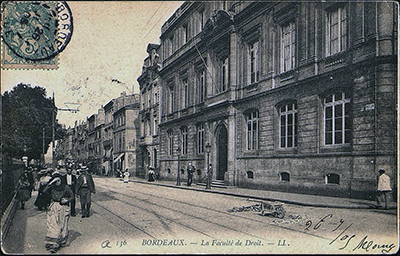The outbreak of war in the summer of 1914 led all European states to solicit the greatest sacrifice from their able-bodied male population. Thus France solicited most of its twenty years old citizens, nineteen even, till the past forty, to join the ranks of the active army. Even if the students appeared as a minority, their departure to the front left a mark. By themselves, they embodied youth, as students were the only social group composed almost exclusively of young people. From then on, the faculties concentrated what could be called “the youth of France”, scrutinized in particular by journalists. In the provinces, student populations were much less important than in Paris. Nevertheless, they continued to grow, as in Bordeaux, where the number of studentspour lire la suite…
Tag: Bordeaux
The reflections of a Bordeaux law professor on freedom of opinion : Duguit and press censorship during the 1914-1918 war
Propaganda occupied a prominent place in the history of the Great War, because of its total and spectacular character. Even today, few textbooks address the years 1914-1918 without mentioning the word “brainwashing”, describing the unanimous and ubiquitous media tone at the beginning of the conflict, exacerbating heroism and national assets while demonizing – even ridiculing – the German enemy. The main challenge was then to convince citizens of the correctness and the merits of the war. Censorship, a negative and complementary aspect of propaganda, was an equally total institution. Total, because the control it exercised extended to all political actors (members of the government, political parties), to all written production (press and publishing) as well as live performances (theater, songs). If the First World War contributed topour lire la suite…
Léon Duguit, German science and the Great War
Pierre Marie Nicolas Léon Duguit was born on February 4, 1859 in Libourne, Gironde. Brilliant studies, both in high school and university, allowed him to obtain the title of doctor at twenty-two years old. Thanks to an age exemption, he was granted tenure the following year. He taught the legal history in Caen, before returning to Bordeaux in November 1886. There, he met sociologist Émile Durkheim, who strongly influenced his legal thinking, tinging it with legal sociology. In parallel with his teaching, Duguit became involved in politics. He claimed to belong to the Léon Bourgeois’s “solidierist” current, represented in Bordeaux by Durkheim. According to Duguit, a jurist has a social role, that of “guide” towards the legislator, because of his discoveries of social laws. Inpour lire la suite…
The perception of German science at the University of Bordeaux during the Great War
On December 8, 1870, Bordeaux, a provincial city far from the fighting between France and the German powers, welcomed the government delegation within its walls for two months. Its distance from the front was an asset, on top of its good relations with England, which allowed it to procure equipment necessary for the war effort. It was during this period that the faculty of law of Bordeaux – “completely forgotten” by the Napoleonic Imperial University – opened its premises again after almost a century of total emptiness, from 1792 to 1870, and this, despite the repeated request of the Bordeaux Bar to obtain its reopening. But it did not really assume its functions until mid-1871, long after the government had left. The war of 1870pour lire la suite…
Gustave Chéneaux, “nothing but good things to be said of him”
On April 29, 1920, in front of an assembly of students and professors of the Bordeaux Faculty of Law, Dean Léon Duguit delivered a speech in which he paid tribute and mourned the disappearance of one of his colleagues, professor of Civil Law Gustave Chéneaux. Published later, this speech arouses contrasting sentiments in the reader, as the will to justify the butchery that was this war transpires in the word of the eminent jurist. However, Duguit’s words were marked by real fondness and palpable sadness as they dwelt on the personality of this teacher, “killed by the enemy” on April 29, 1915 near Verdun. The dean first praised all the simplicity of the disappeared man, his obstinacy and his work ethic. Mentioning these traits, which can bepour lire la suite…
Charles Le Coq de Kerland father and son : two generations of lawyers, from the amphitheater to the open sky
The declaration of war on August 1, 1914 triggered the general mobilization. The number of men between the ages of 20 and 38 called upon to join the army stands at more than 3,800,000. However, the extent of the French contribution to the conflict was not limited to the gluttony of the military institution. Indeed, the entire French society was mobilized into the Sacred Union. For more than four years, entire families, combatants and civilians, saw their activities guided by the hope of victory. This was in response to the requests of the Government, which directed all sectors of social life towards the conflict and set up war propaganda, but also a call of duty for those who had seen their son, father, husband orpour lire la suite…
Women students and student associations in Bordeaux
French universities remained hardly accessible to women. The faculty of Bordeaux, created in 1441, then (re)created in 1870 after its abolition in 1793, illustrated this lack of diversity. The study of the University of Bordeaux in the Great War is a good example to portray the entrance of women – these pioneers – in French higher education, and their commitments as active members of student associations. In France, Emma Chenu and Julie-Victoire Daubié were the first two female students. Respectively enrolled for the former in science and mathematics in 1867, for the latter in Humanities in 1871 (first Frenchwoman to be granted a bachelor’s degree at the faculty of Lyon in 1861). In law studies, it was not until 1884 that two women (one Russianpour lire la suite…
Raymond Thamin (1857-1933) : Memoirs of the Rector of the Academy of Bordeaux in the Great War
Examining the past in search of information on the Bordeaux Faculty of law during the Great War, historians can only be compelled by the discovery of an unknown figure who was nevertheless an important public figure in the history of the Third Republic. Indeed, Raymond Thamin, rector of the Academy of Bordeaux during the Great War, was a scholar with an exceptionally brilliant career. Alumnus of the École Normale Supérieure (1877), professor of philosophy (1880), doctor of letters with a thesis on Saint Ambrose and Christian morality in the 4th century (1896), lecturer at the Faculty of Humanities (1884) and professor at the Lycée Condorcet in Lyon (1894), author in particular of a book on the philosophy of pedagogy titled “L’éducation et le positivisme”, encensedpour lire la suite…
Dissolved, temporary, consecrated : the difficult resurgence of the Bordeaux Faculty of Law
Despite being a pioneer of higher education with its auditorium and the lectures of Ausonius ( ? 310-394) in the 4th century of our era, Bordeaux had to wait a long time before the opening of its first official university. A rich city and major trading port, it only became a place of legal education during the 15th century with the creation of the Universitas Burdiagalensis. Its structure remained substantially the same for nearly 350 years before being swept away by revolutionary impulses. The city produced many renowned jurists such as Nicolas Boerius (1469-1539), Bernard Automne (1574 ?-1666), Étienne Cleirac (1583-1657), Abraham Lapeyrère (1598 ?-1690 ?), or even famous member of parliament Charles Louis de Secondat, baron of La Brède and Montesquieu (1689-1755). In Bordeaux as in many otherpour lire la suite…

